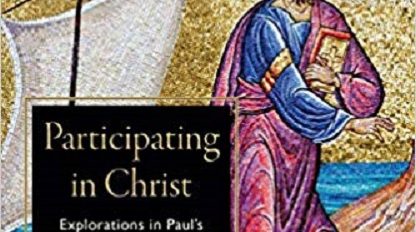
Michael J. Gorman’s book Participating in Christ is a fascinating exploration of a phrase we encounter time and again in Paul’s writings, yet perhaps without considering what exactly it means to be in Christ.
True to the title of the book, Gorman invites us to consider that to be in Christ is not merely an attempt to imitate Jesus’ actions or ethics, but to participate in the very Triune life of God, taking seriously the language Paul uses (for example) in Galatians 5:20 when he says: “…it is no longer I who live, but it is Christ who lives in me…”
Today, I’m picking up on a conversation begun at the First Baptist Church’s facebook page, and delving into chapter three of the book: “Cruciform or Resurrectiform?” Scot McKnight in the Jesus Creed blog is also following this book, so I’ll try not to duplicate his analysis here.
Again, following Paul’s emphasis on the cross as the definitive revelation of God’s character in Christ, and thus the implications for us who then are caught up in the life of Christ here and now, Gorman addresses a pretty important potential critique: what about the resurrection? Should we not give equal (or more) emphasis to participation in the resurrection of Jesus as part of the Christian life?
In one sense, absolutely – apart from the resurrection, our faith is futile, as Paul says in 1 Corinthians 15:16. Yet Gorman’s provocative argument, following the pattern of the Christ hymn in Philippians 2:4-11 and 2 Corinthians, chapters 3-5, is that it is precisely when we are vulnerable and ‘weak’ in the eyes of the world, that God’s resurrection power is displayed. It is in Jesus’ “downward mobility”, of letting go of privilege and status to be a servant in human form, obedient even to death on a cross, that exaltation occurs.
Where that challenges me is to wonder about how anxious we can get (as churches, as pastors, as people) about whether or not we have enough (time / money / resources) to accomplish God’s mission. Perhaps our anxiety stems from our desire to have so much that we can accomplish it “on our own” – though we’d never actually say it that way. Perhaps it is only as we are willing to participate in Christ’s downward mobility, realizing that it’s not about our sufficiency but God’s provision that allows God’s grace and love and resurrection power to be shown.
When we have enough, there’s no need for God to show up, except perhaps to pat us on the head and say ‘well done’! And yet, being willing to faithfully step out where God calls us when we don’t have enough, into the unknown, that’s a dying to ourselves that allows us to see God at work; and that transforms us as well as the world.
Blessings on the Journey
-Pastor Brian
